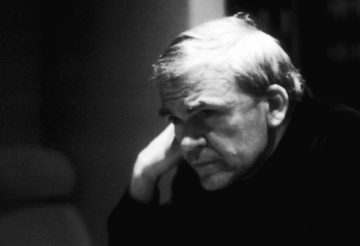Robin Ashenden in Quillette:
 For a long time before his death this week at the age of 94, the novelist Milan Kundera seemed to have fallen out of fashion with critics. Jonathan Coe wrote of his “problematic sexual politics” with their “ripples of disquiet.” Alex Preston complained about the “adolescent and posturing” flavour of the books which had thrilled him in his youth, adding of Kundera’s later novels that reading them was an “increasingly laboured process of digging out the occasional gems from the abstraction and tub-thumping philosophising… a series of retreats into mere cleverness.” Diane Johnson of the New York Times seemed to ring the death knell loudest: “what he has to tell us seems to have less relevance… the world has run beyond some of the concerns that still preoccupy him.”
For a long time before his death this week at the age of 94, the novelist Milan Kundera seemed to have fallen out of fashion with critics. Jonathan Coe wrote of his “problematic sexual politics” with their “ripples of disquiet.” Alex Preston complained about the “adolescent and posturing” flavour of the books which had thrilled him in his youth, adding of Kundera’s later novels that reading them was an “increasingly laboured process of digging out the occasional gems from the abstraction and tub-thumping philosophising… a series of retreats into mere cleverness.” Diane Johnson of the New York Times seemed to ring the death knell loudest: “what he has to tell us seems to have less relevance… the world has run beyond some of the concerns that still preoccupy him.”
Doubtless Kundera’s light had dimmed in the last few decades. No substantial novel had come from him since Immortality (1990), just before he switched from writing in Czech to French. Yet these critics’ withdrawal of support seemed modish, ironic, and not without schadenfreude.
More here.
